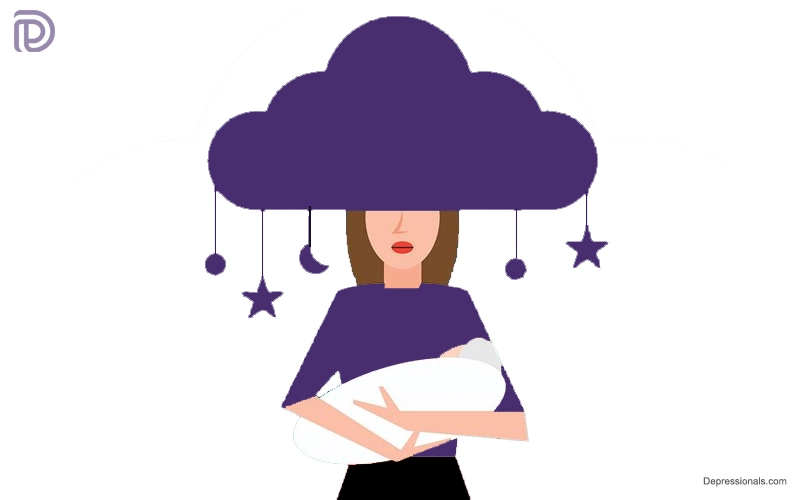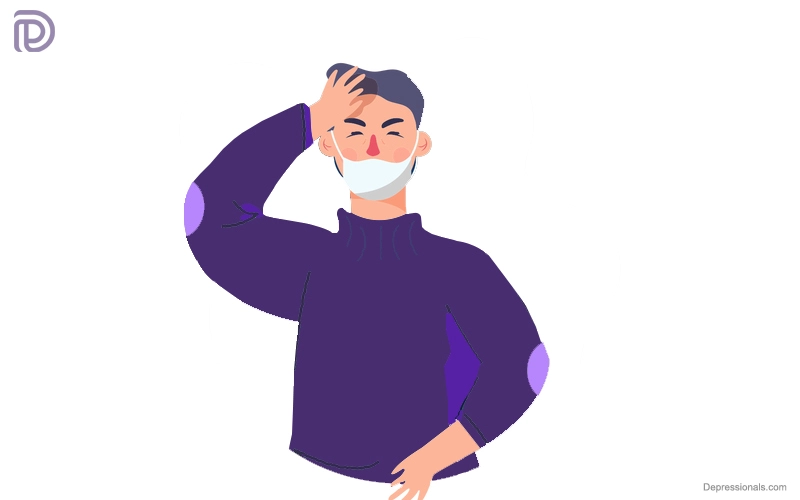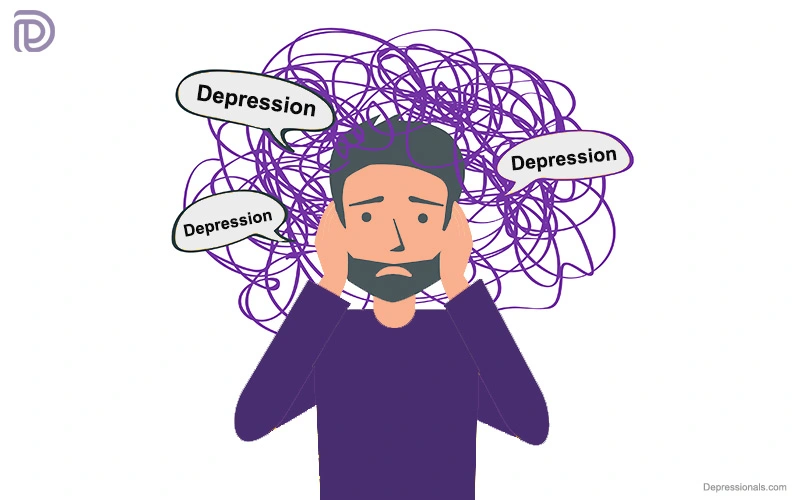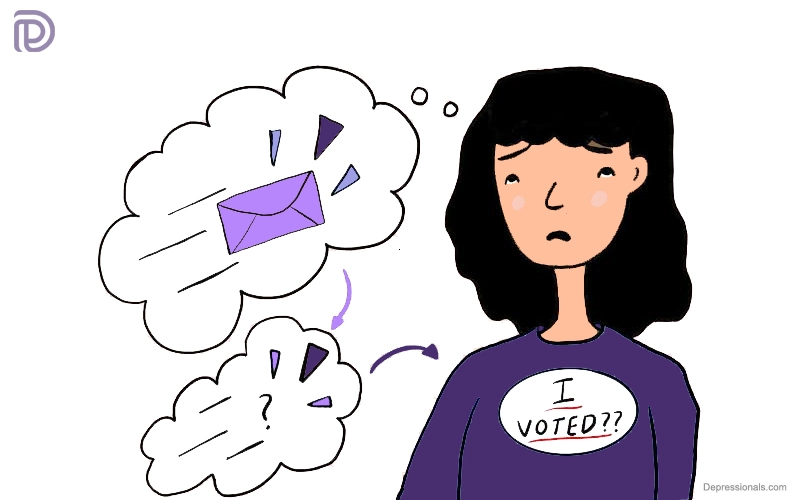Postpartum depression (PPD) is a complicated mixture of physical, behavioral and emotional changes that occur in some women after giving birth. This involves being down all the time. A lot of new parents experience the “baby blues” at first but it is different from that.
What is postpartum depression (PPD)?
A lot of first-time mothers report feeling sad, worried, or fatigued during those first few days after they give birth, known as “Baby Blues”. Around 80 percent of women experience these feelings within a week of giving birth. This is normal and normally goes away within a few weeks.
Postpartum depression differs from the baby blues in many ways, but some of the symptoms are similar.
Postpartum depression lasts longer and is a lot more powerful. Approximately 15 percent of births are monitored, including those of first-time mothers and those who have delivered before.
This condition can make you feel hopeless, cause severe mood swings and exhaust you. You may be unable to care for yourself or your baby because of the intensity of these feelings.
The risk of postpartum depression must not be underestimated. Treatment is available for this serious disorder.
Related: Work Depression
What are the symptoms of postpartum depression?
The normal side effects of having a baby are moodiness and fatigue, but postpartum depression is far more severe. The signs of postpartum depression are severe and may interfere with your daily activities.
Symptoms of postpartum depression depend upon a person’s situation. It is likely that you have some of these signs of postpartum depression:
- You feel sad or cry a lot, even when you don’t know why.
- You’re exhausted, but you can’t sleep.
- Sleeping too much.
- Eat constantly or don’t like the food at all.
- You suffer from various undiagnosed pains, aches or illnesses.
- Don’t know the reason for irritation, anger or anxiety.
- Suddenly, your mood changes.
- The situation seems out of your control.
- It is difficult for you to remember things.
- Concentration is difficult and you have trouble making simple decisions.
- Things that used to interest you no longer do.
- You think you should be filled with joy after a baby, but instead, you feel detached from your baby.
- You feel hopeless and overwhelmed.
- Your feelings are worthless, and you feel guilty about them.
- You avoid talking to anyone because you’re afraid they’ll think you’re a terrible mother or that they’ll take your child, so you withdraw.
- All you want to do is escape.
- There are intrusive thoughts that you might harm yourself or your baby.
Your family and friends may notice that you’re not yourself or that you withdraw from them and social activities.
You will likely begin feeling symptoms within a few weeks after delivery. In some cases, postpartum depression takes time to appear. You may experience symptom relief for a day or two, then they will come back, then the symptoms will return. Symptoms may worsen if untreated.
Related: Persistent Depressive Disorder
Treatment for postpartum depression
See your doctor immediately if you are experiencing symptoms of postpartum depression.
Both medication and therapy can be used to treat postpartum depression. Both can be used separately, but their combined effects may be greater. A healthy lifestyle also involves making some choices every day.
Trying a few treatments will help you figure out which one works best for you. Communicate with your doctor as often as possible.
Medication
An antidepressant directly affects the brain. These substances change the mood-regulating chemicals in the brain. Although they may not work immediately. You may not notice a change in your mood for several weeks after taking the medication.
Antidepressants can cause side effects for some people. Dizziness and fatigue may be among these symptoms. Do not hesitate to tell your doctor if you feel symptoms getting worse due to side effects.
It is okay to take certain antidepressants while you are breastfeeding, but not others. If you are breastfeeding, you should tell your doctor. Your doctor may recommend hormonal therapy if you have a low level of estrogen.
Therapy
Psychologists, psychiatrists and other mental health professionals are capable of providing counseling. A therapist can guide you through destructive thought patterns and offer strategies for dealing with them.
Self-care
Some people have difficulty with this part of treatment. When it comes to self-care, you should be flexible.
If you don’t feel you can handle a certain level of responsibility, do not try. It’s important to tell others what you need, since they may not instinctively know. Do your best to take some “me time” without isolating yourself. Take part in a new mother support group.
Depressants like alcohol are bad for your health. Let your body heal as much as possible. Getting some exercise every day, even a simple walk around the neighborhood is important for a healthy diet and a good lifestyle.
It can take up to six months for most women to feel better after treatment.
Check: Major Depression Disorder
What natural remedies are there for postpartum depression?
Postpartum depression is serious, and it should not be treated by anyone other than a medical professional.
Symptoms of postpartum depression may be improved with both medical treatment and natural remedies such as getting enough sleep and exercise. Relaxation techniques like massage and meditation may help you feel better. Maintain a balanced diet low in processed foods and high in nutrients.
Ask your doctor for the right dietary supplements if your diet lacks certain nutrients.
Supplements
Many people find herbal remedies appealing. The U.S. Food and Drug Administration (FDA) is concerned, such supplements are not regulated in the same way as drugs. Although drug safety is monitored by the FDA, health claims aren’t evaluated.
Furthermore, some natural supplements can cause interactions with medications. Make sure your doctor or pharmacist knows about all supplements you take and the amounts you take, even if they seem harmless to you. Another reason to keep your doctor informed is that many things you eat can end up in your breast milk.
Some people use St. John’s wort to treat depression. March of Dimes believes that insufficient studies are showing if this supplement can be used to treat postpartum depression.
Some evidence suggests that there may be a link between a lack of omega-3 fatty acids and postpartum depression. Taking omega-3 supplements may relieve symptoms, but enough research has not been done to make a definitive statement.
Related: Depression and Divorce
What causes postpartum depression?
The exact cause of postpartum depression isn’t known, but certain factors may play a role. Physical changes and emotional stressors can combine to trigger postpartum depression.
Physical factors
When you give birth, hormones play a major role in your body’s change. When you’re pregnant, you have higher levels of progesterone and estrogen. The hormone level drops to its previous level within hours after giving birth. Depression may result from this abrupt change.
The following physical factors may also contribute:
- Low thyroid hormones
- Sleep deprivation
- Poor diet
- Chronic medical conditions
- Substance abuse
Emotional factors
Those with a history of mood disorders or mood disorders in their families are more likely to suffer from postpartum depression.
Emotional stressors may include.
- Separation or death of a loved one
- Illness or injury of you or your child social isolation
- Financial difficulties
- Unsupportive environment
Read: How to Deal with Teenage Depression
Postpartum depression statistics
Depression vs. the blues
About 80 percent of women experience the baby blues after giving birth. Comparatively, only 14 percent of mothers in a large-scale 2013 study were found to be depressed. One in five of these women considered harming themselves, and one in six had bipolar disorder that had not previously been diagnosed.
Risk factors
According to the study, women who suffer from depression are likely to be:
- Younger
- Less-educated
- Publicly insured
- African-American
Onset
In a study designed to examine the effects of postpartum depression on women, authors interviewed 973 women and found that:
- 26.5% experienced depression before pregnancy
- About 33.4% demonstrated symptoms of depression during pregnancy
- 40.1% of women reported symptoms after childbirth
Getting assistance
A survey by the nonprofit organization Postpartum Progress found that only about 15% of women with postpartum depression receive professional care. Furthermore, only live births are included in these figures.
These studies do not include postpartum depression in women who had miscarriages or stillborn babies. Therefore, there might be a higher incidence of postpartum depression than previously thought.
Related: Childhood Depression
Other statistics
- Anxiety postpartum affects more than 1 in 6 women after childbirth. The rate is 1 in 5 among first-time mothers.
- An estimated 20 percent of postpartum deaths are suicides. This causes the second most deaths among postpartum women.
- Postpartum OCD is relatively rare. Women of childbearing age are affected in 1 to 3 of every 100.
- A few women per 1,000 experience postpartum psychosis after giving birth.
- According to studies, 25 percent of fathers suffer depression in the first year after birth.
- According to a 2010 study, 21 percent of fathers and 39 percent of mothers experience depression during or after the first year postpartum.
How to get support for postpartum depression?

Your first step should be to see your OB-GYN about your physical symptoms. The doctor can help you find a therapist or other resources in your area if you are interested. You can also get referrals at your local hospital.
Maybe it would be easier for you to talk to someone who has gone through the same thing. They have an understanding of how you feel and can offer you nonjudgmental support. If you are a new mother, you might want to join a mother support group.
Some of them may be also struggling with postpartum depression, anxiety or depression. These organizations can provide you with information on resources to help you cope with postpartum depression:
- Postpartum Depression Support Groups in the Canada and U.S: There are many support groups in the United States and Canada (sorted by state).
- Postpartum Education for Parents at 805-564-3888: The “warmline” is staffed by trained volunteers 24/7 for support.
- Postpartum Progress: Women and new mothers who suffer from postpartum depression and anxiety can get information and support from this organization.
- Postpartum Support International at 800-944-4PPD (800-944-4773): Education, online assistance, and local resource information are offered through this resource.
If one support system doesn’t work for you, you can try another. Do not give up until you get the assistance you need.
Read: Loneliness and Depression
How to deal with postpartum depression?
To cope with postpartum depression, you can do a few other things after consulting your doctor. here are 4 tips to cope with postpartum depression:
1. Communicate
Your natural reticence may make you want to keep your feelings hidden from others. However, you might find it helpful to discuss things with someone you trust. Perhaps others will listen to you and you’ll discover that you’re not alone.
2. Fight isolation
Keeping your feelings to yourself can cause depression. Although maintaining your closest relationships isn’t necessary, try to keep your social life as busy as possible. You will feel more connected.
A depression support group or a group for new moms may be right for you if you feel comfortable in a group setting. Try joining a group activity you used to enjoy again if you have stopped doing it. You can focus better and reduce stress when you are in a group.
3. Cut back on chores
Leaving chores and errands to others is okay if you are not up for them. Put your energy into taking care of yourself and your baby’s basic needs. Whenever possible, give your family and friends a helping hand.
4. Rest and relax
Good sleep is important to your physical and mental well-being. If your baby isn’t sleeping through the night, have someone else take the baby’s shift so you can rest.
If you have trouble falling asleep, try taking a hot bath, reading a good book, or whatever helps you relax. You may be able to fall asleep more easily with meditation or massage.
Related: Sleep Disorders
Medications for postpartum depression
Selective serotonin reuptake inhibitors
Sertraline (Zoloft), fluoxetine (Prozac), and paroxetine (Paxil) are selective serotonin reuptake inhibitors (SSRIs). Antidepressants are the most common form of treatment for depression. They act on serotonin, which controls mood.
The side effects of these medications are generally less severe than those of other antidepressants.
Atypical antidepressants
Several neurotransmitters in the brain are also targeted by these new antidepressants. Venlafaxine (Effexor) and duloxetine (Cymbalta) are examples of atypical antidepressants.
Monoamine oxidase inhibitors and tricyclic antidepressants
They affect the neurotransmitters in the brain. Side effects tend to occur with them, and they are often prescribed only when all other options have been exhausted.
Related: COVID-19 and Depression
Considerations and side effects of antidepressants
There are many side effects associated with antidepressants, including:
- Dry mouth
- Nausea
- Dizziness
- Headaches
- Insomnia
- Restlessness
- Fatigue
- Weight gain
- Perspiration
- Diarrhea
- Constipation
- Anxiety
- Tremors
In order to get the best results from antidepressants, patients must be patient. Do not skip a dose or take them other than as prescribed. The dosage will be small at first, and you will be able to increase it slowly if it doesn’t work.
Finding the best medication and dosage for you may require some trial and error. Your doctor will need to monitor you closely while you take antidepressants.
If you’re taking antidepressants for a long time or are on a high dose, it’s possible you’ll have to taper off when you stop. It is potentially harmful to stop abruptly.
Read: What is Perinatal Depression?
Hormone therapy
Your estrogen levels may be low enough to benefit from hormone therapy. Hormone therapy can cause various side effects, including:
- Weight changes
- Breast pain or tenderness
- Nausea and vomiting
Certain cancers can also be increased with hormone therapy.
It is important to let your doctor know if you are breastfeeding before using any hormone therapy or medication. Your baby can receive some of these medications through breast milk.
What is severe postpartum depression?
If postpartum depression is not treated, it can become significantly worse. Whenever the thoughts of harming others or yourself result from it, it’s dangerous. These kinds of thoughts should be treated as soon as they appear.
Signs of severe postpartum depression are:
- Hallucinations, such as smelling, hearing, seeing or feeling what isn’t really there
- Having irrational beliefs, exaggerating small things, and feeling oppressed
- Talking nonsense and being disoriented
- Unusual or erratic behavior
- Violence or rag
- Suicidal thoughts or attempts
- Threats against your baby
These are all indicators that you need immediate medical attention. It may be necessary to be hospitalized. It is possible to treat severe postpartum depression successfully.
Read: Economic Depression
What factors increase the risk of postpartum depression?
It does not matter how old or how many children a new mother has, she can get postpartum depression.
The following factors might increase your risk:
- Depression or another mood disorder
- Previous mental illness history
- Severe health issues
- Recent stress, such as a recent divorce, a serious illness or a death of a family member
- Being pregnant unintentionally
- Giving birth to twins, triplets or more
- Having a premature or sick baby
- Relationship abuse
- Lack of social support
- Poor diet
- Substance abuse
- Sleep deprivation and fatigue
When you notice symptoms, you should speak to your doctor if you have some of these risk factors. You’re more likely to abuse substances or harm yourself or your baby if you suffer from postpartum depression.
Read: 4 Major Ways Depression Effects on Brain
Postpartum depression prevention
There is no such thing as absolute prevention. You may be able to reduce your risk of postpartum depression by reducing certain factors.
Be proactive in the first place. In pregnancy, tell your doctor if you have any of the following:
- If you have experienced postpartum depression in the past.
- If you have ever suffered a major depressive episode or another mood disorder.
- If you are currently suffering from depression.
You may be able to avoid any unnecessary medical treatments If your doctor prescribes the proper therapy and makes recommendations in advance.
Keeping these tips in mind may help you reduce your risk of postpartum depression:
- Be prepared before you give birth to your baby.
- Write down your action plan. Make sure you include the contact information of your doctor, local support services, and a friend or relative you can confide in.
- Make childcare arrangements in advance so that you can take a break. You should know what to do if you start to experience symptoms.
- Get some exercise every day and follow a healthy diet.
- Stay involved in your favorite activities and get plenty of sleep.
- Stay in touch with those you love.
A new baby changes the dynamics of the family and changes sleep patterns. Don’t strive for perfection, so take it easy on yourself. Consult your doctor as soon as possible if you experience symptoms. You will recover faster if you receive treatment early.
Read: How to Get Out of a Depressive Episode
What is postpartum psychosis?
Psychosis associated with postpartum depression is the most severe form. It is rare to experience postpartum psychosis. Most of the time, it occurs within the first few weeks of delivery. A history of mood disorders increases your risk of psychosis.
When you lose your sense of reality, you go into psychosis. It is rare to experience postpartum psychosis. It generally occurs in the first couple of weeks after giving birth. It is common for postpartum psychosis to occur alongside bipolar disorder.
In the early stages, symptoms include insomnia, restlessness and irritability. Baby blues or sleep deprivation may be mistaken for these signs.
A common symptom of hallucinations is to see, hear, smell, and feel things that do not seem to be real. If your baby is being harmed or if you feel as if bugs are crawling on your skin, you might hear a voice telling you to harm them.
There are various delusions including grandiose ideas and emotions of persecution despite contrary evidence. You may believe others are plotting against you. Babies can also cause delusions.
The following symptoms may also be present:
- Disorientation, confusion, and unfocused speech
- Rage feelings that don’t seem to make sense
- Acting irrationally, such as hurling objects or lashing out at people
- Rapid mood swings
- Suicidal thoughts or attempts
- Imagining you should give up on the baby or wishing to give them up
There is no known cure for postpartum psychosis. Self-injury or injury to your child is a real risk. Consider medical attention immediately if you experience these symptoms after giving birth. Postpartum psychosis can be treated. It is usually treated with antipsychotic medication and hospitalization.
How is postpartum psychosis treated?
Psychosis is treated with a variety of medications. These medications can help control your symptoms and keep you stabilized. They include:
- Mood stabilizers
- Antidepressants
- Antipsychotics
Your symptoms can be controlled and stabilized using these medications. Electroconvulsive therapy (ECT) is another option if they don’t. A chemical change in the brain is triggered by electrical currents. Postpartum psychosis can be effectively treated with it as it’s generally well-tolerated.
As soon as you’re stabilized, your doctor might recommend that you seek help from a therapist.
You should continue receiving treatment even after leaving the hospital. You may need to adjust your medications as you recover.
It is also important to keep up with your treatment plan if you also have a mental health condition such as bipolar disorder or another mental disorder.
Read: Teen Depression
Postpartum anxiety
Postpartum anxiety surpasses postpartum depression as the most prevalent form of postpartum depression. After giving birth to a child, one in six women suffer from it.
A new baby can cause you to feel stressed and worried. This can often result in anxiety that affects our daily lives.
A hyperventilation attack or panic attack is among the common symptoms. In hyperventilation, you breathe so deeply and quickly that your carbon dioxide levels become low. You may not be able to breathe.
Heart attack symptoms can mimic panic attacks. There are several symptoms involved, including:
- Pounding heartbeat
- Chest pain
- Sweating
- Shortness of breath
The following symptoms of postpartum anxiety may also be experienced:
- Overwhelmed by worries, even about little things
- Anxiety keeps you from sleeping
- You keep thinking about the same problems even when they have been solved or aren’t important
- Lack of concentration because of worry
- Too much worry that something will go wrong
- Worrying that you are sick or imagining that you are ill
Having anxiety and depression simultaneously makes it hard to figure out what’s wrong without a doctor.
It is possible for postpartum anxiety to improve or worsen as it progresses. Consult your doctor if you have any concerns. Many antianxiety medicines and therapies are available to treat anxiety.
Read: Situational Depression
Postpartum OCD
There is likely a lot of pressure to have everything perfect for your baby, so you probably want to raise them in a healthy environment. New moms often think those things. Unfortunately, stress can sometimes lead to the development of Obsessive-Compulsive Disorder (OCD).
Unlike postpartum depression, OCD is not very common after childbirth. A woman with a child develops OCD about 13% to 30% of the time. The process usually begins within one week of delivery.
Baby’s safety is likely to become their obsession, although they can be about anything. A parent might worry that their child will die during the night or that they will be dropped.
Ritualistic behaviors are sometimes associated with postpartum OCD. Here are some examples:
- Repetitive cleaning, organizing, and obsessing about germs that might come into contact with your baby
- Checking on your baby again and again during the night
- Constantly praying for the safety of your baby.
- Routine behaviors such as touching something and counting in a certain way
- Doing a lot of research on the health of you or your baby
These behaviors may not be under your control. Consult your doctor if you experience symptoms of postpartum OCD that don’t resolve.
Therapy alone or antidepressant medication can be used to treat postpartum OCD.
Postpartum depression in men
Many new fathers experience the blues at times. Men also experience these feelings as a new mother does and they tend to fade away as everyone adjusts to the new situation.
Also, men can develop paternal postnatal depression, which is a form of postpartum depression.
Related: Endogenous Depression
Symptoms and prevalence
Women and men may exhibit similar symptoms of depression, but a father’s depression tends to develop more slowly. Because of that, they can be difficult to identify. Furthermore, fathers do not receive follow-up medical care as mothers do, so depression might go unnoticed.
As a result, new fathers often feel isolated and overwhelmed by these feelings.
Up to 25 percent of fathers in their first year of parenting report feeling depressed, but men are less likely to report such symptoms. It is common for first-time fathers to feel more anxious after the birth of their child.
Causes
Men who suffer from postpartum depression have not been the subject of many studies. Theoretically, testosterone levels and other hormones may be involved. Sleep deprivation, stress, and changes in the family dynamic may be contributing factors.
Risk factors
Fathers who are depressed may experience postpartum depression. A previous mental health problem such as depression or bipolar disorder is also a risk factor. In that situation, you should consult your doctor before birth. Please mention any signs of depression, regardless of how slight they may be.
Treatment
Parents should also set up a support system for their children. Spending time with friends, scheduling childcare, or joining a depression support group are all factors to consider.
The same rules apply to new fathers as they do to new mothers, such as eating a nutritious diet, exercising regularly, and getting plenty of sleep. Your doctor should be consulted if you continue to have depression symptoms or if they are severe.
It is possible to treat depression either with counseling or with antidepressant medications. A couple’s counseling or a family’s counseling may be an option for those whose parents show signs of depression.
Read: Biology of Depression
Outlook for postpartum depression
Postpartum depression after pregnancy is a common and potentially dangerous mental health condition. A person’s symptoms can worsen without treatment, making it more difficult to care for both themselves and the baby.
It is recommended that any woman experiencing a low mood after delivery for more than two weeks should visit a doctor. A treatment program can be very helpful.






I was very pleased to find this web-site.I wanted to thanks for your time for this wonderful read!! I definitely enjoying every little bit of it and I have you bookmarked to check out new stuff you blog post.
I like what you guys are up also. Such smart work and reporting! Carry on the superb works guys I¦ve incorporated you guys to my blogroll. I think it’ll improve the value of my website 🙂